英语专业词汇学课件1.What is Lexicology
词汇学第一章

words in a language. 但词汇也可以指一种方言、一本书、
Classification of words
Full words: content/notional words They are meaningful in themselves. (nouns, verb, adj, adv, numerals) Form words: grammatical/functional words They are meaningful only when combining with other words. So they have no independent meanings proper(狭义的,严格意义上的). (articals, prep, conj, pron, pronominal adverbs) (代副词: when, where)
The Riddle Game
1. A mouse has a large pocket. What is it? 2. What room has no walls, no doors, no windows, and no floors? 3. I begin with T and end with T,and I am full of T. What am I? 4. How do we know the ocean is friendly? 5. What will you break once you say it? 6. Who is closer to you, your mom or your dad? 7. What letter is a question?
1What is lexicology
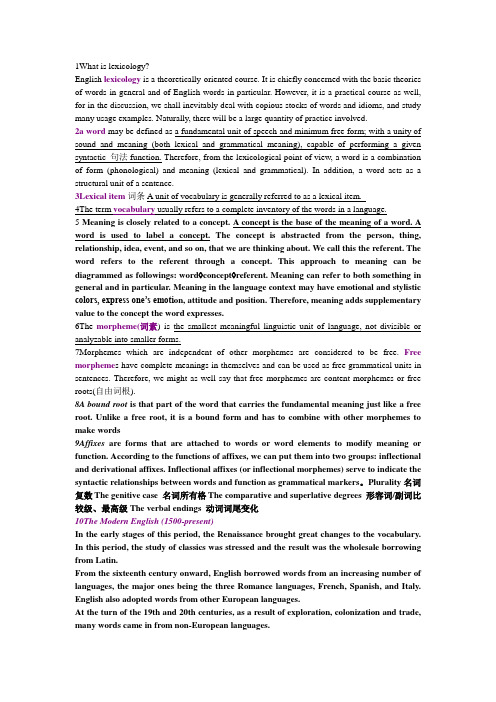
1What is lexicology?English lexicology is a theoretically-oriented course. It is chiefly concerned with the basic theories of words in general and of English words in particular. However, it is a practical course as well, for in the discussion, we shall inevitably deal with copious stocks of words and idioms, and study many usage examples. Naturally, there will be a large quantity of practice involved.2a word may be defined as a fundamental unit of speech and minimum free form; with a unity of sound and meaning (both lexical and grammatical meaning), capable of performing a given syntactic 句法function. Therefore, from the lexicological point of view, a word is a combination of form (phonological) and meaning (lexical and grammatical). In addition, a word ac ts as a structural unit of a sentence.3Lexical item词条A unit of vocabulary is generally referred to as a lexical item.4The term vocabulary usually refers to a complete inventory of the words in a language.5 Meaning is closely related to a concept. A concept is the base of the meaning of a word. A word is used to label a concept. The concept is abstracted from the person, thing, relationship, idea, event, and so on, that we are thinking about. We call this the referent. The word refers to the referent through a concept. This approach to meaning can be diagrammed as followings: word◊concept◊referent. Meaning can refer to both something in general and in particular. Meaning in the language context may have emotional and stylistic colors, express one’s emoti on, attitude and position. Therefore, meaning adds supplementary value to the concept the word expresses.6The morpheme(词素) is the smallest meaningful linguistic unit of language, not divisible or analyzable into smaller forms.7Morphemes which are independent of other morphemes are considered to be free. Free morpheme s have complete meanings in themselves and can be used as free grammatical units in sentences. Therefore, we might as well say that free morphemes are content morphemes or free roots(自由词根).8A bound root is that part of the word that carries the fundamental meaning just like a free root. Unlike a free root, it is a bound form and has to combine with other morphemes to make words9Affixes are forms that are attached to words or word elements to modify meaning or function. According to the functions of affixes, we can put them into two groups: inflectional and derivational affixes. Inflectional affixes (or inflectional morphemes) serve to indicate the syntactic relationships between words and function as grammatical markers。
英语词汇学精品PPT课件
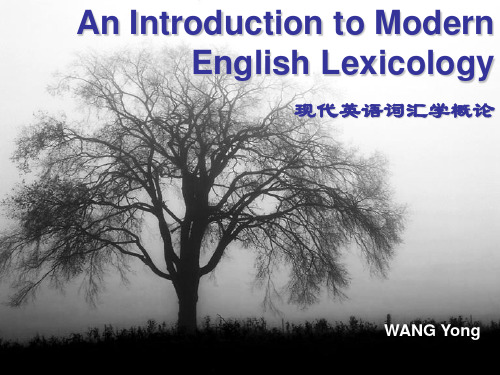
9
About the course
ORIENTATION
10
1.1 Aims of the course
– Give a systematic description of the English vocabulary.
16
• What is a word?
– The minimal free form of a language, which has a given sound, meaning and syntactic function.
– Ultimately improve your receptive and productive skills in language processing as well as language production.
12
1.3 Arrangements
• Oral Presentation
– Group of 4-5 for ONE CHAPTER – One group each week
• Essay
– A short essay about the relevant topic(s) – 3 weeks before the end of the course
13
1.4 Grade
• Oral presentation • Short essay • Final exam
14
An Introduction to Modern English Lexicology
词汇学第一章 The Basic Concepts of Words and VocabularyPPT
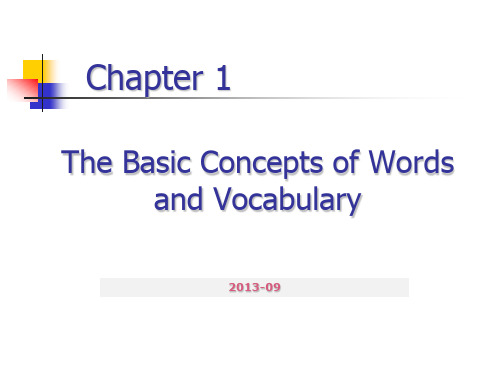
1.4 Sound and Form
Task 1 Say the following words by yourself.
cough
thought
though
thorough
tough
through
Question: why is there the disparity?
The international reason Changes Borrowings
1.3 Sound and Meaning
In how many languages do you know the name of the animal in this picture?
Task 1 Say the name of the animal in
as many languages as you can.
content words and which are functional words? denote never and run notion upon seven Christmas have would
1.5.3 Native words & borrowed words
Task
Guess whether the statements are true or false.
non-basic vocabulary
Not all the words of the basic word stock have these features.
Non-basic vocabulary include:
Terminology 专业术语 Jargon 行话 Slang 俚语 Argot 隐语 Dialectal words 方言词 Archaisms 古词语 Neologisms 新词语
英语词汇学chapter 1 Lexicology

With stylistics: Leech defines stylistics as the study of the use of language in literature and considers stylistics a meeting ground of linguistics and literary study. To put it here concerning lexicology, Stylistics is the study of optional variations in the sounds, forms, or vocabulary of a language, different situations of use, or different literary types.
Lexicology
The
first semester of 2013-2014
Chapter one the definition of lexicology
1.1 Lexicology
The term lexicology contains two Greek morphemes: lexicon and logie. The former means word and the latter means learning or the study of. The literal meaning of the term is the science of words
Chapter one the definition of lexicology
Students will use the basic knowledge of English lexicology to understand the material already familiar to them from English classes and apply it in their further study of English.
词汇学及相关学科.ppt

If we want to express meanings, we need to have a store of words that we can select from when we wish to express these meanings under the control of grammatical rules.
What is linguistics then? Linguistics is the scientific study of
languages.
Lecture 1
Connection of Lexicology with Other Branches of Linguistics
语言学的主要内容
A /bull-ˋcalf is a young bull.
2. With grammar
Vocabulary and grammar are organically related to one another.
In learning a language, attention to grammar is as important as attention to vocabulary.
语义学(semantics),分析语言单位和所指内 容之间的关系。
语用学(pragmatics),分析语言符号和使用者之 间的关系,如何通过语言符号表达语言符号所 表达的以及语言符号之外的意义。
The nature and domain of lexicology
Lexicology is a branch of linguistics, inquiring into the origins, meaning and uses of words.
English Lexicology (Introduction) 英语词汇学 教学课件
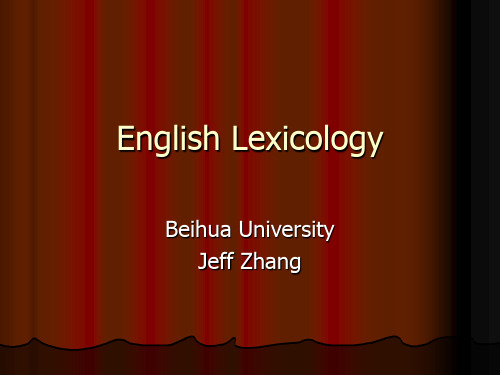
Its Relation to other Disciplines IV
Stylistics:
Stylistics is the study of style. It is concerned with the user’s choices of linguistic element in a particular context for special effects, including lexis, phonology, syntax, graphology.
Lexicology focuses on the lexical level, dealing with the types of meaning and sense relations such as :Polysemy, homonymy synonymy, Antonymy, hyponymy, and semantic field, which constitute an important part of lexicology
lexicology: the form , meaning , origins and usage of words. They have pragmatic differences. A lexicographer’s task is to record the language as it is used to so as to present the genuine picture of words to the reader, providing authoritative reference . While the student of lexicology is to acquire the knowledge and information of lexis so as to increase their lexical awareness and capacity of language use.
English Lexicology 1-1
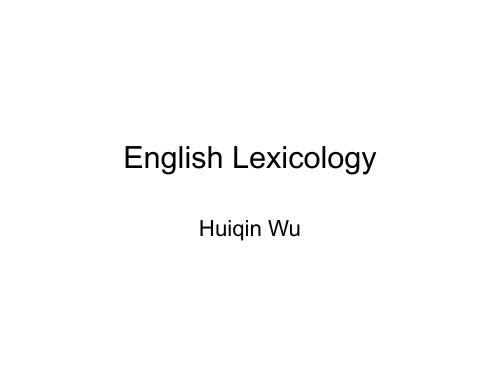
• Only lexicologists who do write dictionaries are lexicographers. • Lexicography is the practical lexicology, it is practically oriented though it has its own theory, while the pure lexicology is mainly theoretical.
• Keywords: external structure, morphological, morpheme, word family, central, peripheral, root, affix
Identification of words
• Stability: stable linguistic units.
– I usually have dinner at 6 but yesterday I had it at seven.
• How many words are there? • How many times did the word “have” occur?
1.1.1 The physical structure of a word
- 1、下载文档前请自行甄别文档内容的完整性,平台不提供额外的编辑、内容补充、找答案等附加服务。
- 2、"仅部分预览"的文档,不可在线预览部分如存在完整性等问题,可反馈申请退款(可完整预览的文档不适用该条件!)。
- 3、如文档侵犯您的权益,请联系客服反馈,我们会尽快为您处理(人工客服工作时间:9:00-18:30)。
3. A branch of linguistics concerned with the meaning and use of words
Lexicology and syntax
Colorless green ideas sleep furiously.
In-class games
The first question was difficult
second word
easy
third problem funny
last examination silly
planets
Definition of Lexicology Morphology Semantics Etymology Lexicography
“The limits of my language are the limits of my world.”
英语词汇学引论 修订版 武汉大学出版社 林承璋 编著
Where do English words come from? Word meaning Meaning relations Word formation Words in use English dictionaries
After-class assignments
62 English words in
Morphology(形态学) Semantics(语义学) Etymology(词源学) Lexicography(词典学)
morphology
Study of morphemes and their arrangements and their arrangements in forming words.
Morphemes are the smallest meaningful units which may constitute words or parts of words.
etymology
The study of the whole history of words, not just of their origin
More definitions of lexicology
1. An area of language study concerned with the nature, meaning, history and use of words and word elements and often also with the critical description of lexicography
Kinship terms
father mother son daughter cousin nephew uncle aunt grandfather grandmother
Color terms black white red green yellowill be included in this course?
What is Lexicology?
Lexicology: the study of lexis, understood as the stock of words in a given language, i.e. its vocabulary or lexicon.
Vocabulary Lexis Lexicon
4. The study of the form, meaning, and behavior of words
Related fields
Linguistics:The study of the nature, structure,and variation of language, including phonetics, phonology, morphology, syntax, semantics, sociolinguistics, and pragmatics.
现代英语词汇学概论 北京师范大学出版社 张韵斐 主编
nice bridegroom depart
Semantics
The study of meaning
lexicography
A special technique, the writing and compilation of dictionaries
Lexicology as a level of language analysis
Lexicology and phonology
pill and bill sheep and ship meat and meal
Prosodic features
ex’port and ‘export re’cord and ‘record
Compounding
‘greenhouse ,green ‘house ‘greyhound ,grey ‘hound ‘White House ,white ‘house
